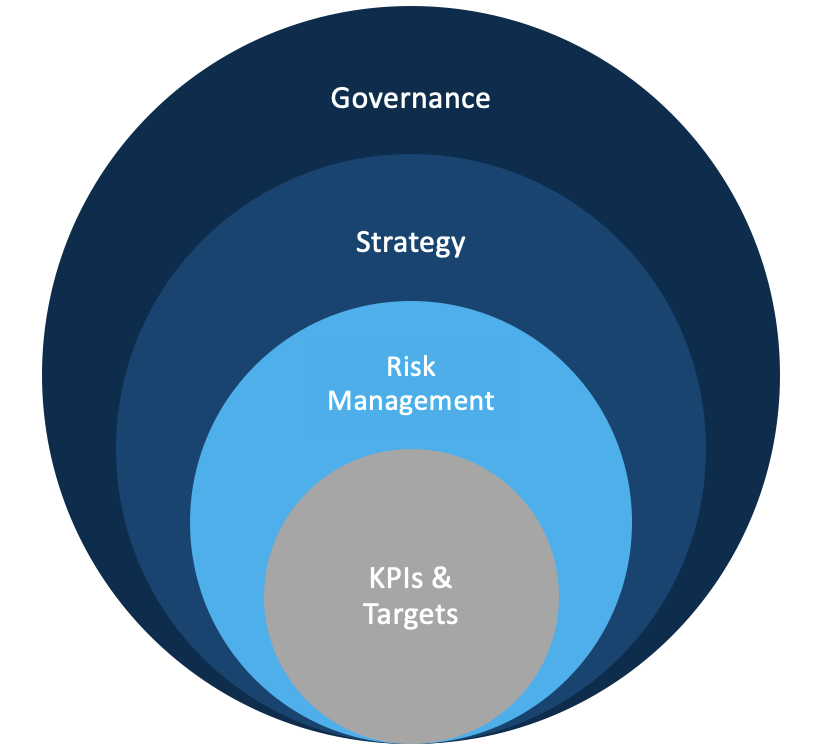Climate-related Risk and Opportunity Analysis
TCFD
Climate-related risks can have a big impact on financial markets. The Task Force on Climate Related Financial Disclosure (TCFD) covers this reference in the ESG context. The TCFD was established back in 2015 after COP21 by the Financial Stability Council of the G20 countries with the aim of examining how the financial sector can better consider climate-related issues. The standardized and international framework created from these deliberations aims to integrate the impacts of climate change and the resulting financial risks and opportunities for companies in a common approach. Note: With the publication of its last status report in October 2023, the task force has disbanded after successfully fulfilling its mandate. The progress of companies’ climate-related disclosures will be monitored by the IFRS Foundation in future.
TCFD leads to transparency about possible future scenarios that may impact business activities. Thus, awareness and knowledge about the impacts of climate change and thus the financial resilience and robustness of companies is created.
TCFD figures at a glance
- Whitepaper: Net-Zero
- UN GCD Climate Guidebook
- Website: TCFD
- Website: TCFD Knowledge Hub
Relevance
Why an analysis of climate-related risks and opportunities is important
Transparent disclosure in accordance with TCFD enables better communication, assessment and comparability of climate-related risks and opportunities. This enables a more efficient allocation of capital within the company and on the financial market, and strengthens the transformation to an ESG-compliant economy and a low- or zero-carbon future. The four basic TCFD areas and their eleven specific recommendations will also be used to strengthen corporate resilience and thereby the confidence of investors, lenders and insurance companies.
In summary, the benefits of a risk and opportunity analysis at a glance:

- Develop a basic strategy for climate risks and opportunities
- Anticipate and prevent climate risks
- Raising awareness and knowledge about the effects of climate change
- Resilience and competitive advantage
- Climate risks are thus monetary risks: Implementation creates positive financial impact
- More confidence among investors, less pressure from shareholders and activism
- Increased brand value, higher company valuation
- In preparation for the disclosure requirements, in particular the CSRD from 2024
The basic TCFD contents
- Governance
Disclosure on corporate governance with regard to climate-related risks and opportunities
- Strategy
Disclosure of material actual and potential impacts of climate-related risks and opportunities on the company’s business, strategy and financial planning
- Risk Management
Disclosure on how the company identifies, assesses and manages climate-related risks
- KPIs & Targets
Disclosure of main KPIs and targets needed to assess and manage relevant climate-related risks and opportunities

Future Orientation
Why companies need to act now
In the UK, the TCFD standard is already mandatory. As part of the CSR reporting obligation, the EU is also introducing the necessary focus on companies’ climate-related risks and opportunities. “The Alliance”, consisting of GRI (Global Reporting Initiative), CDSB (Climate Disclosure Standards Board) and CDP (Carbon Disclosure Project), also supports the TCFD standard and thus makes the risk and opportunity analysis an integral part of their own frameworks and represents a significant lever to improve disclosure assessment.
TCFD under CSRD
ESRS E1
Companies subject to the CSRD must report in accordance with the European Sustainability Reporting Standards (ESRS) for sustainability reporting. The ESRS include reporting requirements on environmental goals, social aspects and governance aspects. One important objective from the six different environmental objectives covers the topic of climate protection and adaptation to climate change (ESRS E1). These are also based on the recommendations of the TCFD, particularly with regard to the identification of financial (transitory and physical) climate risks and opportunities.
TCFD-Services
With the package “TCFD Basic” DFGE covers the three basic elements of TCFD. Thus, according to the current status, an important preparation for the EU CSRD reporting obligation is enabled, as well as an essential basis for important questions is created for the next CDP season. DFGE assists in the selection and prioritization of relevant climate risks and opportunities, as well as in the preparation of climate-related scenario analyses. The process includes a gap analysis, a materiality analysis of climate-related opportunities and risks, and a scenario analysis. In this way, climate-relevant risks and opportunities can be identified and assessed at an early stage, and measures can be derived.
Gap-Analysis & TCFD-Methodology
- Comparison of the current alignment in the company and the TCFD recommendations (Guiding Questions) with regard to the four areas
- Review for full, partial or no alignment
- Identification of strengths, gaps and areas for improvement
Materiality Analysis
- Interviews & workshops to identify relevant R&O (Risks and Opportunities)
- Categories Covered: Physical risks, transition risks and opportunities
- Qualitative description
- Basis for prioritization in scenario analysis and assessment of impacts.
Hot Spot Scenario Analysis
- Definition of different scenarios (at least 2)
- What factors should be considered when selecting scenarios?
- Conduct a scenario analysis to examine the impact on the respective Climate Risks and Opportunities
Optional: Customised services beyond “TCFD Basic” if disclosure in accordance with the TCFD standard is required. Further support with TCFD (In-Depth Scenario Analysis + Business Resilience Assessment) on request. The risk and opportunity analysis according to TCFD is sufficient for CDP and the internal climate strategy, and is also mostly CSRD-compliant. If formal TCFD reporting and the addition of the missing elements are still being sought, this is already an optimal preparation. Support in carrying out a risk and opportunity analysis in accordance with the CSRD and ESRS E1 is also available on request.
Californian State Bill 261
- Determine if they are subject to the law: The bill applies to U.S. companies doing business in California with annual revenues over $500 million.
- Prepare biennial climate-related financial risk reports: These reports must detail the climate-related financial risks the company faces and the measures they’re taking to mitigate and adapt to those risks.
- Align disclosures with TCFD recommendations: The reports should be consistent with the Task Force on Climate-Related Financial Disclosure (TCFD) framework.
- Cover specific content: Reports should include information on physical and transition risks related to climate change, as well as potential opportunities and strategic priorities.
- Submit reports to the California State Air Resources Board: The first report is due by January 1, 2026, with subsequent reports required every two years.
- Make reports publicly available: Companies must also publish these reports on their websites.
- Prepare for review: Submissions will be reviewed by the Climate-Related Risk Disclosure Advisory Group, which will identify inadequate reports.
- Stay informed about upcoming regulations: The California Air Resources Board (CARB) will draft and implement additional regulations related to the law, including enforcement and penalties for non-compliance.
Companies should start preparing now by assessing their climate-related risks, developing mitigation strategies, and establishing processes for data collection and reporting to ensure compliance with SB 261 by the 2026 deadline.



